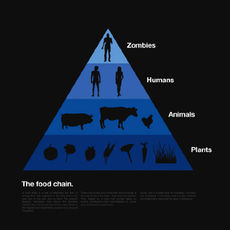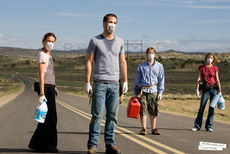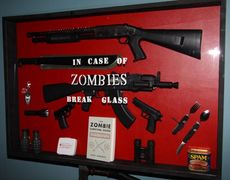Environment
Zombies: Everything You Need To Know
Do you believe in Zombies? A brief history and analysis.
Posted May 24, 2013
Do you believe in zombies? If not, have you at least noticed that zombies are the new black? They're everywhere, and they have a plethora of fans. On TV there is Bite Me, Ugly American and Team Daryl which was spawned by The Walking Dead (chosen as the #1 Show on Television).
Popular books include the New York Times bestseller The Zombie Survival Guide, as well as Real Zombies: The Living Dead and Creatures of the Apocalypse, Pride and Prejudice and Zombies and World War Z. At the movies we have Night of the Living Dead, Planet Terror, 28 Days Later and Zombieland.
And of course hundreds of websites, like Dead Walking, Land of the Dead and Homepage of the Dead, are devoted to zombies and surviving their onslaught. A Google search of ‘zombies’ yields 117 million hits.
It's not just television, books and films that are cashing in on zombies. Preppers, as seen on National Geographic's Doomsday Preppers are spending millions to survive a zombie apocalypse (and other end of world scenarios). They are buying land, growing their own food, stockpiling weapons and designing zombie proof bunkers. In today's culture, zombies are major players and big business. Vampires on the other hand are dead; just so last decade.
OK, I’ll admit it. I never dreamed I’d be writing a blog on Zombies. But when I learned that the prestigious CDC, (Centers for Disease Control and Prevention) has a section dedicated to Zombie Preparedness, I was intrigued.
Don’t feel bad if you're not sure what a zombie is, because the definition has gone through several modifications over the last 200 years. Here’s a brief history of zombies:
Despite the recent interest, zombies are not new. They have been around for hundreds of years, originating from Africa and Haiti. The term zombie comes from the African religion of Voudou (or voodoo) and the word ‘nzumbi’, meaning an animated corpse or body without a soul.
Originally, witchcraft or voodoo was thought to bring the body back to life. Voodoo sorcerers performed the ritual and then kept these un-dead souls under control, for personal gain. Back then, they didn’t eat human flesh; rather they were a source of power, control and terror to be used by the witch doctor in charge. 

Originally, witchcraft or voodoo was thought to bring the body back to life. Voodoo sorcerers performed the ritual and then kept these un-dead souls under control, for personal gain. Back then, they didn’t eat human flesh; rather they were a source of power, control and terror to be used by the witch doctor in charge.
Eventually over the last 50 years, the idea of zombies controlled by voodoo was replaced by the more believable scenario of a brain damaged human-like creature aimlessly walking the earth. The thesis was that a viral infection would cause an encephalitis (brain inflammation) which damaged the higher cortex- the thinking part of the brain- while causing physical disabilities and a craving for human flesh. Being bitten by someone infected would of course transmit the virus.
Consider the Spanish flu of 1918. This deadly flu pandemic infected 500 million worldwide, and killed an estimated 100 million people. It remains one of the deadliest natural disasters in history. Similarly the Black Death, caused by a bacteria, killed close to 200 million Europeans in the mid-1300s. Pandemics are real and viruses mutate, so it's not that difficult to imagine a virus with zombie-producing consequences infecting millions.
However, the zombie of today has taken on yet another meaning (though, there are still many believers in the earlier definitions as well). These zombies represent the after effect of some global catastrophe that brings down the electric grid and causes social chaos and civil unrest. A super volcano, monster earthquake, currency collapse, terrorist attack, nuclear war, accelerated global warming, massive solar flare, giant rogue meteor or a variety of global pandemics could all cause what preppers call, TEOTWAWKI --“the end of the world as we know it”.

Imagine food being scarce – or non-existent. Imagine water not coming out of the faucet, no electricity, no gas. Starving men and women roaming the streets, looking for something -- anything -- to eat. And it's not limited to just your city or country, it’s worldwide.
Now imagine those with food, shelter and supplies. It wouldn't be long before they were attacked by those without, the starving, the desperate. Imagine being so hungry you'd kill anything to eat, even another human. The mob mentality would kick in, with the have-nots attacking the haves.
These have-nots represent the new zombie, a starving mob willing to kill and looking for anyone who has food or water. This scary scenario prompts preppers to stockpile food, water and gear, and to have weapons and ammo at the ready for protection from the masses -- the zombies -- that are out to get these supplies.

Most zombie films, books and shows simply show the zombie either coming from out of the woods or from around the corner and give very little insight into what caused the zombie like condition. After all, the action is fighting the zombies, killing the zombies, escaping the zombies and surviving the zombies. It’s not speculating about what brought about the un-dead, be it voodoo, weird science, an apocalypse, a virus or whatever.
This brings us back to the CDC's website and their new Zombie Preparedness page. Now that you understand the new, improved and believable meaning of zombie, the site makes more sense. The word "zombie" got your attention, right? As the CDC director, Dr. Ali Khan, says, "If you are generally well equipped to deal with a zombie apocalypse you will be prepared for a hurricane, pandemic, earthquake or terrorist attack."
I now ask again: Do you believe in zombies?




